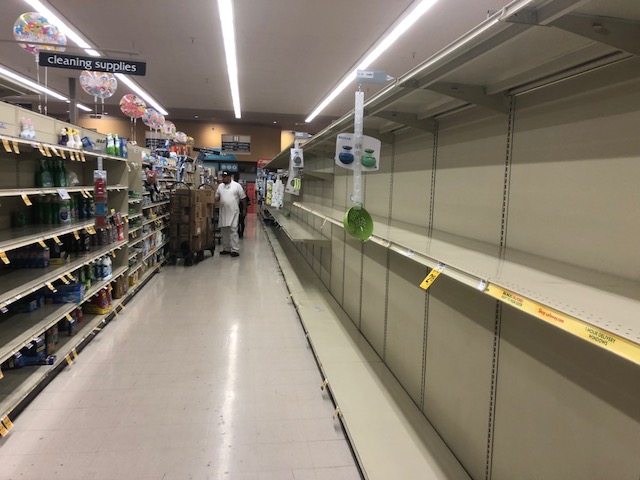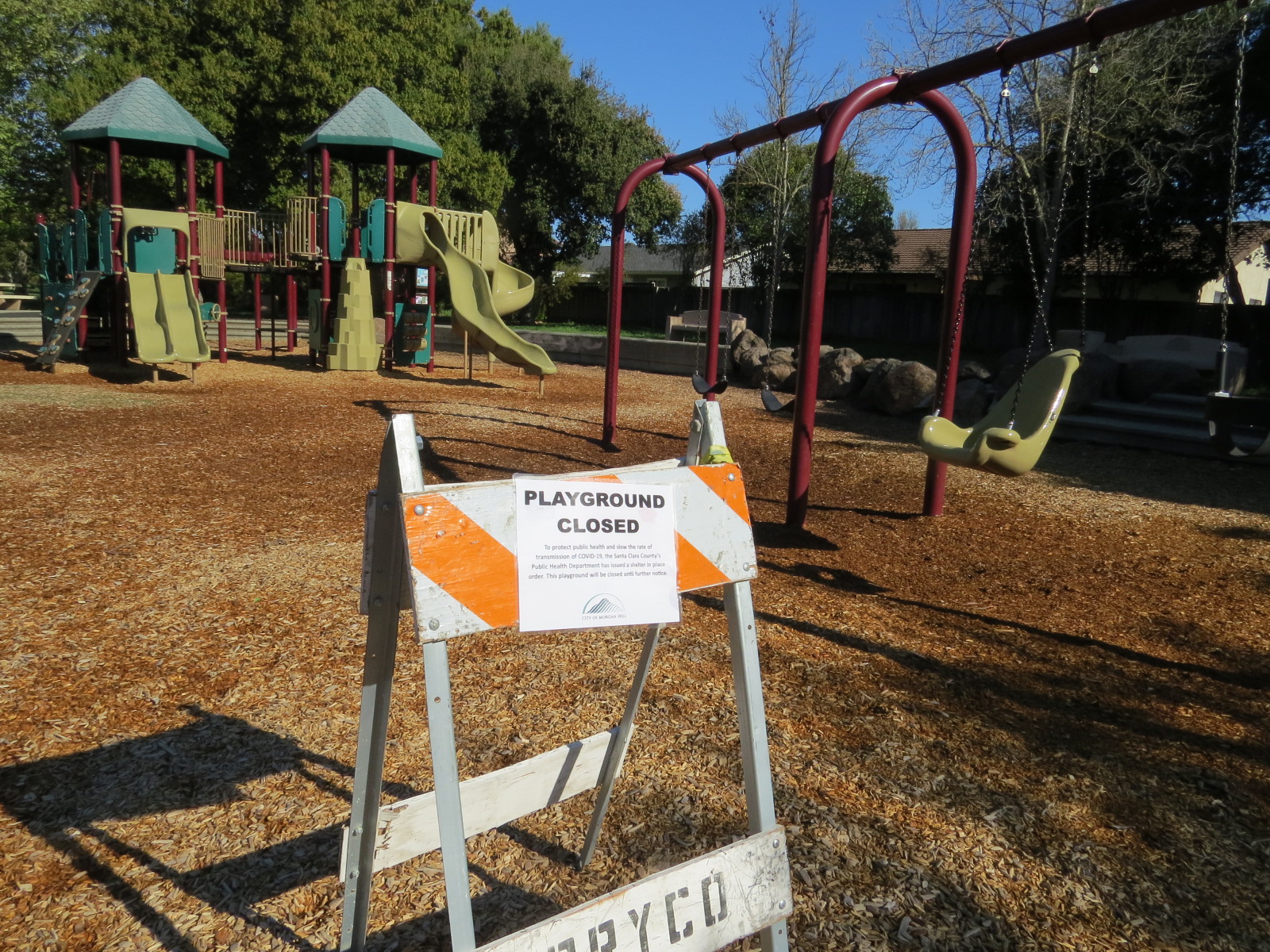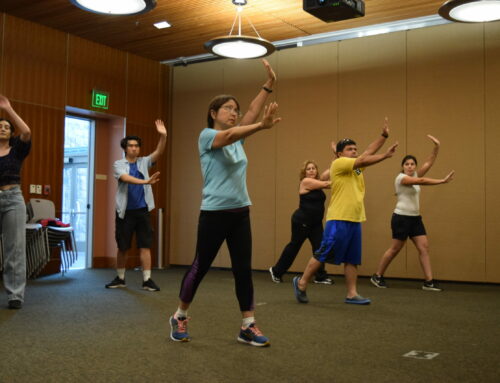COVID-19 infects more than 189 Santa Clara County residents, economy is taking a major hit

Photo by Robert Airoldi
Workers stock empty shelves at the Tennant Station Safeway store. Most stores in Morgan Hill and across the country have seen a run on toilet paper, cleaning products, canned goods and rice and pasta.
By Robert Airoldi and Marty Cheek
With the March 16 order by local health agencies for Santa Clara County residents to shelter at home and close all non-essential businesses, Morgan Hill residents are feeling the social and economic impact of the global pandemic.

The virus claimed the life of a Hollister man in his 60s with health issues.
“Based on the data we know the rate of COVID-19 will accelerate,” Cody said. “These are tough decisions and we need to make them quickly.”
The respiratory illness has been confirmed in 169 countries and territories. According to Centers for Disease Control data as of March 20, nationwide, more than 15,000 cases have been confirmed with 217 deaths. Globally, more than 254,000 cases are confirmed with 10,406 deaths.
The county declared a local state of emergency Feb. 10. Gov. Gavin Newsom declared a statewide emergency March 10. President Trump on March 13 declared the public health crisis a national emergency, which frees up resources and funding. March 19 he urged Americans not to travel outside the country. And, March 19, Newsom declared a state-wide shelter in place.
The Morgan Hill City Council unanimously ratified a local state of emergency proclamation at its March 18 meeting where city councilmembers at home attended by conference call, with Mayor Rich Constantine presiding in the Council Chambers. Gilroy’s City Council ratified a similar proclamation at its March 16 meeting. The declarations enable the cities to receive federal funding and other money to pay for services required to help their residents during the coronavirus crisis.

Photo by Marty Cheek
City of Morgan Hill officials closed all playgrounds in city parks due to the COVID-19 outbreak, including this one at Paradise Park.
“You don’t want to be behind the eight ball in declaring an emergency,” said Maureen Tobin, the city’s communications and engagement director. “If you wait and then you need extra assistance or extra funding, then you may have missed that opportunity. We’re certainly not trying to create a sense of fear or panic. At this time, it’s very much an administrative decision.”
The actions taken by officials from local to federal government agencies are required to “flatten the curve” of the number of people catching the COVID-19 virus, which spreads easily though human contact, health experts say. The virus can cause severe symptoms for vulnerable populations, particularly older adults, and individuals with underlying chronic health conditions.
 In response to the county’s order, the city of Morgan Hill closed facilities to the public for non-essential services. These include the Community Center, City Hall, the Morgan Hill Library, the Centennial Recreation Center, the Aquatics Center and the Outdoor Sports Center. City parks are still open, with the exception of downtown’s Railroad Park and the Skate Park, but the playground equipment and picnic areas cannot be used because of the danger of virus transmission. All schools in the county are closed as well as Gavilan Community College.
In response to the county’s order, the city of Morgan Hill closed facilities to the public for non-essential services. These include the Community Center, City Hall, the Morgan Hill Library, the Centennial Recreation Center, the Aquatics Center and the Outdoor Sports Center. City parks are still open, with the exception of downtown’s Railroad Park and the Skate Park, but the playground equipment and picnic areas cannot be used because of the danger of virus transmission. All schools in the county are closed as well as Gavilan Community College.
“We encourage the community to get out so long as they are observing the social distancing guidelines. Get out and take walks. It’s very good for us mentally and physically,” Tobin said.
She stressed the importance of the community taking action to attempt to prevent the spread of the virus by physical distancing and the shelter-in-place order by the county. The order has impacted local businesses from manufacturing to retail as people are forced to stay home. Grocery stores and supermarkets have seen their shelves emptied as concerned shoppers stock up on items. Local restaurants are closed to dining, but many offer take-out. The Premium Outlets in Gilroy and service businesses such as hairstylists considered non-essential have closed.
Many community events and fundraisers have been canceled including the Poppy Jasper International Film Festival, which would have opened April 1 for eight days of cinematic celebration. Gilroy Gardens has delayed the opening of their park until at least April 4. The AAUW Wildflower Run scheduled for March 29 was canceled, but organizers encourage residents to participate in a “virtual run” April 19 to 26 to raise money for scholarships and its programs. Participants can pay their entrance fee, get their t-shirts and other goodies from a location (or mailed) and can run or walked from any location they choose.
The health and safety of local residents, businesses, employees, and visitors is the top priority and the city will stay proactive in making sure public safety and basic services such as water and utilities continue to be available, Tobin said. City leaders encourage the community to stay calm, safe, and share information with friends and neighbors who may not have access to social media or other resources.
“It’s scary for people because it’s so uncertain,” Tobin said. “And then they’re not hearing about anybody they know being sick, but then they’re discovering you can be carrying it but not have the symptoms. And then you can still pass it on to others.”
Santa Clara Valley Medical Center’s coronavirus response is headed by Dr. Jennifer Tong. The system includes St. Louise Regional Hospital, which is preparing for a growing influx of coronavirus patients from the South Valley in the coming weeks.
“If they should need support from our other hospitals, we have identified intensive care unit beds and low-level beds at both of our other hospitals where we can provide that support and accept such patients,” Tong said.
To keep beds available for those most in need, the hospital system has deployed a telephone triage system to help identify patients who are safe to manage themselves at home.
Self-management for COVID-19 is much like self-management for influenza, Tong said. People should take over-the-counter medication, get plenty of rest, and receive monitoring for any worsening conditions.
“Some other healthcare practices we recommend for influenza we also recommend for potential COVID-19 cases,” she said. “Try to sleep in your own bedroom, try to use a separate bathroom from others at home if you can, wash your hands frequently, don’t share bath towels, and, of course, don’t share kitchen utensils.”
For those who don’t have access to their own bedroom, Tong recommended wearing a mask, but this only applies to the person who might be infected with the virus.
“Let’s say it was a single parent at home with a child and no other person to care for the child, we would recommend simple masking with something like a surgical mask to help protect the individual who is at home from the one who is infected,” she said.
Tong stressed those who are not infected should not mask themselves, citing a worldwide shortage of face masks.
“It’s really critical that we ensure that healthcare workers are protected,” she said.
Santa Clara County’s Public Health Department gave a general recommendation that individuals who feel they have been exposed or are exhibiting symptoms should contact their primary physician who will determine if a test is needed.
Staff at Visit Gilroy, a state Welcome Center at the Premium Outlets, said the virus has affected South County’s tourism industry.
The majority of Visit Gilroy’s yearly international visitors come from either China or Taiwan. In February, visits from Chinese tourists were down 75 percent compared to February 2019.
“I’ve been doing tourism for 16 years and I’ve never experienced anything quite like this,” Visit Gilroy Executive Director Jane Howard said. “We’re in uncharted territory, and I think all of us are just doing our best to adjust and respond accordingly.”
Santa Clara County District 1 Supervisor Mike Wasserman, who represents the South Valley community, described COVID-19 as unlike anything the South Valley community or the world have ever seen since the Spanish influenza of 1918 because the disease spreads rapidly and its mortality rate is very high. That pandemic a century ago killed as many as 50 million people.
“Our communities, our state, our country and the world have effectively come to a standstill, and fear of what’s next is in everyone’s minds,” he said. “I’m proud of the way our Public Health Department has responded to this crisis and the thousands of people working 24/7 to ‘slow the roll’ of this virus spreading.”
The shelter-in-place order is a tough one, especially on small businesses and the self-employed, but county health officials and other leaders believed it to be the best course of action at this time, he said.
“Take care of yourselves and your loved ones,” Wasserman encouraged. “We will get through this. Be strong.”
People clearing supermarket shelves of essential food items is a sign that residents are worried about what long-term outcome the coronavirus crisis will bring for themselves and their families, Tobin said. And going to crowded stores at this time increases the chance they might pick up the virus.
“There is no need for hoarding. There is no need for packing up for months and months of food supply. It’s not as if our food supplies have been impacted except for how people are responding,” she said. “There obviously is a lot of uncertainty. And, of course, with human nature, people see other people responding in certain ways such as buying lots of toilet paper or whatever, and so think, ‘Oh, I better get some.’”
The Santa Clara County Library System has set a tentative reopening date of April 12, in line with the Santa Clara County School District plans to re-open following spring break. SCCLD recommends patrons hold onto physical library materials on loan until efforts to contain the virus are lifted and the libraries reopen.
No late fees will be assessed during the closed period. The library has many online library services available through the website. The library district canceled all events in March and April.
“Closing public libraries is an extraordinary measure and a decision that is not taken lightly,” said Jennifer Weeks, acting county librarian in a press release. “The decision to close is driven by our first priority — protecting the public and our staff’s health and safety.”






